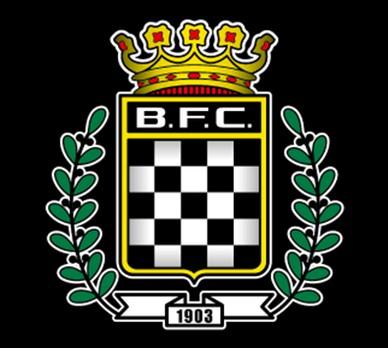 In the latest instalment of PortuGOAL’s in-depth analysis of the lesser known Liga NOS teams, we turn the spotlight on one of only two clubs outside the traditional Big Three to ever win the Portuguese championship - Boavista.
In the latest instalment of PortuGOAL’s in-depth analysis of the lesser known Liga NOS teams, we turn the spotlight on one of only two clubs outside the traditional Big Three to ever win the Portuguese championship - Boavista.
At the turn of millennium the Porto-based club shocked the football world by becoming champions of Portugal and regular participants in the Champions League. But from the dizzying heights of their golden era, Boavista fell to a desperate low and years in the wilderness following demotion to the third tier on the back of corruption charges.
Having returned to the top flight three years ago, the Axadrezados are now in midst of building a competitive team again, in no small measure thanks to the astute work of coach Hugo Leal. Tiago Estêvão runs the rule over Boavista’s 2016/17 vintage.
The most recent non-big 3 champion and one of the only five teams that have won the title in this country, Boavista is about as historic as you get. Some of our older readers will have memories of them in the Champions League, going toe to toe with Dortmund and Liverpool – even going past the group stage in 2001/02.
After dropping down to the third tier to then be shot back into the top division a couple of seasons ago, their focus has been mainly on retaining their spot this high in the pyramid. After a shaky start, they’re now on course for a very safe season in the worst-case scenario, since they’re only four points behind Marítimo who are sixth. As they quietly climb up the table, a European run could be still put in place. Despite still having to face Vitoria Guimarães, Sporting, Benfica and Rio Ave in their last 9 fixtures.
 Miguel Leal – a coach on the rise
Miguel Leal – a coach on the rise
In a case similar to Maritimo, Boavista fired their South American coach early on in the campaign to then get on track under Miguel Leal. And apologies for something but this will be a lot about him, probably my favourite Portuguese coach since his time with Penafiel – I’m serious. I was lucky enough to meet him after declaring my admiration for him and am absolutely delighted that, after proving his worth with both Penafiel and Moreirense (look how poorly they’re doing now), he finally got a shot at a larger club.
Clever in the way he reads the game and approaches matches, Leal is a brilliant motivational coach who gets everyone in the locker room to move and think as a collective unit. He adapts well to his opponents, not feeling the need to display a certain kind of football with the purpose to please anyone, he has the sole objective of getting points in mind.
Based on a solid defensive structure and often taking advantage of quick counters and set pieces, Boavista’s 4-3-3 is in many ways similar to Marítimo’s. With just 25 goals conceded in 25 matches, only Braga, Maritimo, Porto, Benfica and Chaves have a better defensive record. That said, unlike Marítimo’s very positive home record, Leal has won only two home matches since arriving in October, while on the road he has picked points consistently. As he admitted after the 0-0 draw with Moreirense, the team has trouble assuming possession and taking over the game, since generally in away matches you have no pressure into doing that, quite the opposite, which is when Boavista feel more comfortable.
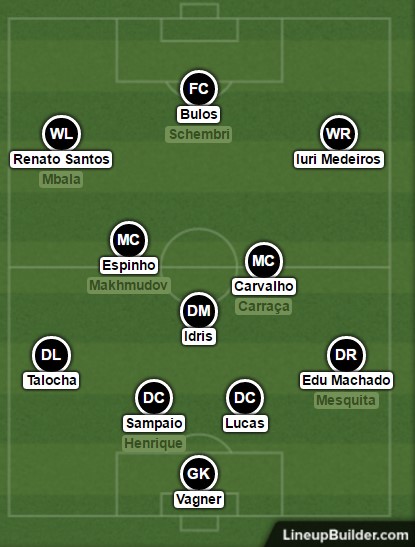 Vagner boost between the sticks
Vagner boost between the sticks
With goalkeeper Vagner’s arrival from Belgium in January, a problem of inconsistency was solved as Mika’s great performances got him a jump to Sunderland and Agayev, his Azeri replacement, was a gamble both in quality and in how he would gel with a foreign backline. Vagner now has seven starts for Boavista, keeping four clean sheets and conceding only 3 goals. The former Estoril goalkeeper is definitely a big part of the team’s recent jump in quality.
Arriving in the summer from Scottish side Hamilton, Lucas has been the most consistent out of all the centre-backs. Due to a mixture of injuries and suspensions there’s been more rotation than expected in this sector. Lucas leads the league on clearances per game with an outstanding 6.5 that shows just how deep Boavista tends to sit. His solidity in the back – top 20 in the league for both aerials won per game (2.7) and interceptions pg (2.9) – is complemented by his presence up front in set-pieces, with him scoring 3 goals so far.
Nuno Henrique was very often picked earlier on, while another Brazilian, Sampaio, has won the spot in the eleven as of late. Henrique is, in my eyes, the superior player: a more complete centre-back, who is less mistake prone than Sampaio, has more defensive actions per game and commits fewer fouls but he appears to have had a tough time recovering his spot. Either way, Sampaio and Henrique combine for 3 further goals.
Set-piece threat
This shows just how impactful set-pieces are for Boavista’s offensive dynamic, with 63% of their goals coming from dead-ball situations and – if we rule out 15% of those which were penalties – you have 48% for corners and free-kicks in which the defenders and defensive-mid Idris (3 goals as well) have scored a significant proportion.
In a remarkable story that involves quitting his job as a mechanical engineer and making the jump from the third division to the first in one summer at 27, Talocha has not only been living from football for the first time ever – he has also been a regular in Boavista’s starting eleven; only him and Lucas have over 2,000 minutes played this season.
The right side has been shared between Mesquita and Edu Machado. Edu, who came up with Chaves last season, has won the spot under Leal. Both full-backs tend to have major defensive responsibility and not as much offensive output, mainly due to the way their team plays. With over 2 tackles, interceptions and clearances per game each, they’re constantly involved within their own midfield but don’t see much of the ball themselves, often not being too involved offensively. No assists for neither, a key pass every four games on average and 0.2 crosses per match.
Tactical tweak
The key moment for the organization of this Boavista side was Miguel Leal’s decision to switch from a 4-2-3-1 to a 4-3-3 without any real change in personnel. Idris has been the team’s defensive midfielder from the start, a rock in the basis of the trio that serves not only a defensive positional purpose but also the aim to win the ball back with physicality. With 3.9 aerials won per match, Idris tops the league on that stat, helped by his 189-cm height and is constantly recovering possession. But Idris’s mobility and ability with the ball are extremely limited, and the team would struggle both when it came to launching counters or trying to build up play.
Espinho is probably the polar opposite of Idris characteristic-wise. He is a technically gifted attacking midfielder, solid passer, who likes to be in control of the ball as often as possible but who wasn’t getting it due to his overly advanced position without any proper build-up behind him. So he started playing as more of an interior CM in a classic midfield trio. He now gets the ball in lower positions, constantly offering Idris a short passing lane, so he can then combine with a striker who drops or slice a pass between lines so wingers can exploit the space. A combination of four assists so far and 1.5 key passes per match (leading his team, 13th league-wise) show exactly that, and his penalty-taking duties have contributed positively as well.
On the other side of the trio the position has been divided between Carraça and Anderson Carvalho. Carvalho really does notch up the tempo of the midfield, playing in more of a box-to-box role. Quicker than the rest of the midfielders, he can cover up well on the wings and covers a larger portion of terrain. Tied for 5th in the league on tackles per match, his defensive contribution is clear, having more of an active tendency to pressure than the rest of the midfield. His 60% pass accuracy may not impress for someone who plays in the middle of the park but that’s not necessarily where his role lies.
Carraça and Azeri international Makhmudov are two other slightly more offensive minded options, for midfield. Carraça is constantly in rotation with the starting eleven and has impressed at times, often being a slightly less intense, better on the ball version of Carvalho, with his capacity from in and around the box being a highlight, while Makhmudov has only been given around 200 minutes of game time thus far.
Talking Tactics
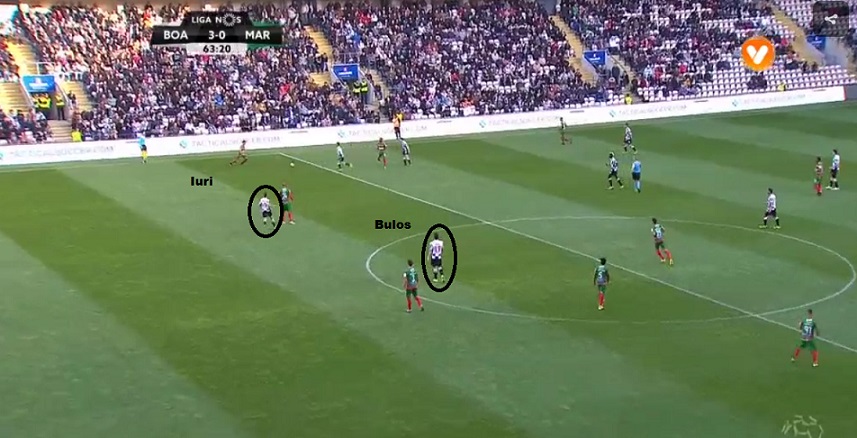
A shape that Boavista often assumes on the counter, with Iuri Medeiros moving centrally to support Bulos, here in a moment where they manage to steal the ball relatively high up the pitch. Carvalho closes down the right side where he steals the ball, proceeds to send a through ball into Iuri who assists Bulos for the 3-0 v Maritimo.
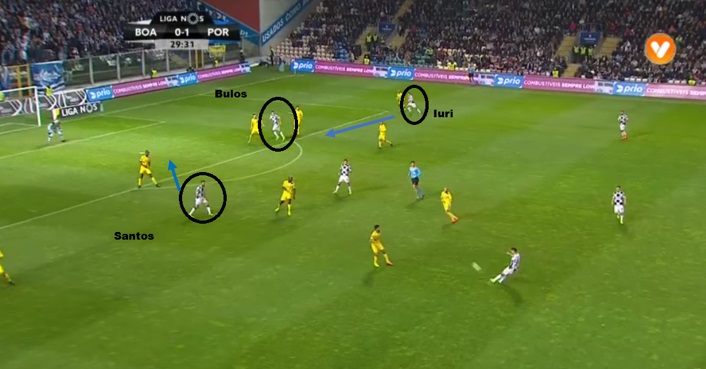
The long ball which Boavista utilizes so often. Here it’s Carraça in midfield who sends it to the target man up top, Bulos either holds it or heads it down immediately for the incoming wingers who are ready to move inside or towards the top of the box.
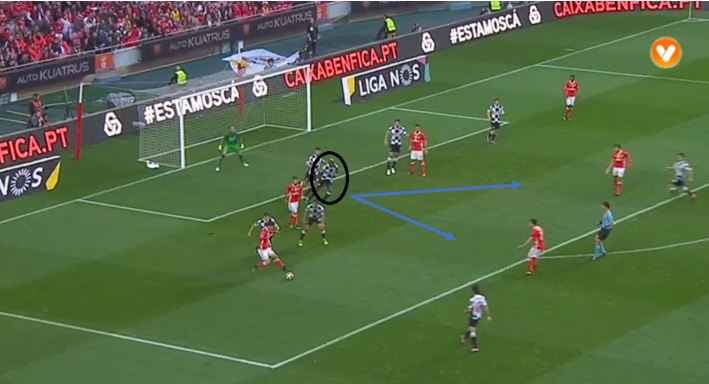
You’ll see Boavista defending with a large number of men in the box quite often. Here against Benfica they block all options in the heart of the box and, once a pass is played for either of the two free men at the top of the box, Idris moves closer quickly to block an incoming shot or pass.
Winger threats
The two wingers have been settled from the start: Renato Santos and Iuri Medeiros. A right-footed player on the left and a left-footed player on the right, Boavista’s wingers have the clear mindset of being the team’s biggest creative sources. Renato is talented, performed well last season and continues to be one of the biggest creative outlets of his side. Rumours have linked him to a jump and even to a jump to Sporting. I personally don't believe his ceiling is that high, but I’d be happy for him to prove me wrong. Either way a contribution to 5 goals (3 goals, 2 assists) is positive for someone who works his socks off defensively.
A star of the future?
On the other side Iuri Medeiros is the man to look out for: many, including myself, were expecting him to settle in Sporting’s squad after his outstanding season with Moreirense last year. JJ’s preference for Gelson, Matheus and Podence didn’t help him but in truth he didn’t impress me in his pre-season matches either. He seemed nervous, succumbing to the pressure, making way too many poor decisions on the ball. Perhaps he wasn’t well integrated, perhaps the birth of his second daughter drove him mentally distant at the time (apologies for bursting the bubble of those who forget footballers are still people). We don’t really know, but what we do know is that he is performing well and will likely get another shot at Sporting next season.
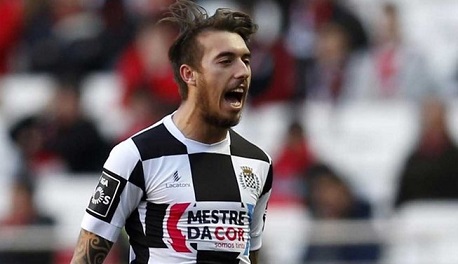 At 22 he still has plenty of time to grow and 7 assists combined with 4 goals in just over 1,500 minutes are a great sign. His direct free-kicks are probably the best ones in the league at the moment, a weapon fewer and fewer teams seem to have at their disposal. From the top of the box to wider angles, Iuri has shown all of his quality in dead ball situations, even scoring two in one match (v Maritimo), and at Benfica’s Estádio da Luz the pressure clearly wasn’t fazing him there as he put in a superb performance. His shot quality is way above average in general, whether from the edge of the box or after he gets in behind the defence.
At 22 he still has plenty of time to grow and 7 assists combined with 4 goals in just over 1,500 minutes are a great sign. His direct free-kicks are probably the best ones in the league at the moment, a weapon fewer and fewer teams seem to have at their disposal. From the top of the box to wider angles, Iuri has shown all of his quality in dead ball situations, even scoring two in one match (v Maritimo), and at Benfica’s Estádio da Luz the pressure clearly wasn’t fazing him there as he put in a superb performance. His shot quality is way above average in general, whether from the edge of the box or after he gets in behind the defence.
His 1.4 key passes per game are on par with Gelson and Jonas’s numbers. If Iuri had a more consistent finisher ahead of him, I’m sure he’d be leading the assist list by now. On what is very much a roaming role, he doesn’t put in as much of a defensive shift which might give him trouble under Jesus but it wouldn’t be bad at all if JJ could try him out as a second striker.
Up top, Malta International Schembri was the chosen one for most of the season but had trouble scoring. Playing as more of a second striker for a large portion of his career, the 30 year old struggled to adapt to being a lone striker in a 4-3-3, even if Iuri Medeiros gives him plenty of support inside. He had the tendency to wander around in the hope of seeing more of the ball, combining with his teammates, but then he isn’t able to position himself in the box to receive crosses and isn’t ready to be on the shoulder of the last man.
Bulos a pleasant surprise
Bulos arrived in January to solve that, so much so that as soon as he began to gel he became the undisputed starter. Despite not arriving with the best feedback backing him up – with Chilean football experts mentioning he didn’t offer much of a threat in front of goal while others said he was average at best – Bulos has been impressing. Close to 190cm tall, he is a lot more of a target man than Schembri and at 23 still has room to improve. In 418 league minutes, he already has the same number of goals (2) scored by Schembri in 1,526. In the same amount of minutes, Schembri took 15 shots total, but the Peruvian already has 9. The difference is clear: Bulos is a lot more of a threat and still has the capacity to hold the ball well when long balls are used to get out of trouble in the back. I still would like to watch both strikers play together but I doubt it’ll happen anytime soon.
The squad definitely has issues and, in a lot of ways, are overperforming. A ton of their goals have come from set pieces, while Iuri Medeiros and Fabio Espinho are so key for the team’s offensive process that whenever they’re not there or have a below-average match, everyone seems stuck and out of ideas. Without space to play, they’ll have a ton of trouble breaking the lines as well, which brings us back to their home matches in which they can’t unlock certain defences if these don’t push up. Their 1-0 home defeat to Belenenses is a perfect example.
The direct style of play is evidenced when you compare them with the other teams in the league: no other team wins more aerials per match, no other team makes more interceptions, no other team makes more tackles per game. They concede very few shots per game (11.4, less than that only Rio Ave and the big three) showing their solid defensive structure. On the other end of the spectrum, no other team makes fewer dribbles per match, they’re in the top 3 fewest shots per match (and most of the ones they take, 51%, are from outside the box), have the 2nd lowest average pass accuracy, 5th lowest for short passes pg, and the 4th worse possession – you get my point.
Europe a possibility
The January transfers that I thought could give the team the depth they needed offensively – Rochinha and Mbala – have 84 minutes played…combined! No matter their style of play, the team has everything to make a late run for Europe. In their last nine games, they’ll face two direct competitors, Rio Ave and Vitoria Guimarães, and two of the big three, Benfica and Sporting, but many of the other teams around their position have even more difficult schedules. As long as their key players remain healthy, Miguel Leal’s men could still look to catch Maritimo who are 6th and only four points away.
The Portuguese coach already renewed his contract for next season so no matter if they end up in a Europa League spot or not, Boavista will have an interesting summer in preparation for next season where they’ll try to make a run for a higher spot in the table from the get go.
by Tiago Estêvão
Related: In-depth team analysis - Chaves
Related: In-depth team analysis - Vitória de Guimarães
Related: In-depth team analysis - Marítimo
Related: In-depth team analysis - Belenenses
Related: In-depth team analysis - Nacional da Madeira

